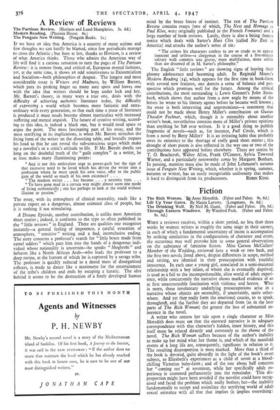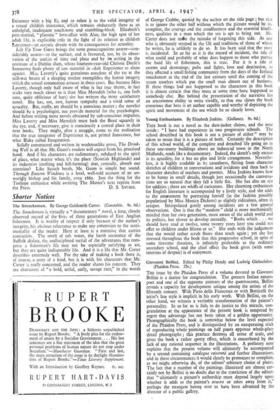Fiction
The Rich Woman. Anne _Meredith. (Faber and Faber. 9s. 6d.)
Lift Up Your Gates. By Maura'Laverty. (Longmans. 8s. 6d.) •
WHEN a reviewer receives, within a short period, no less than three works by women writers at roughly the same stage in their careers, in each of which a fundamental uncertainty of intent is accompanied by striking similarities in the configurations of character and event, the occurence may well provoke him to some general observations on the substance of feminine fiction. Miss Carson McCullers' Member of the Wedding, reviewed here a week or two back, and the first two novels listed above, despite differences in scope, method and setting, are identical in their preoccupation with youthful innocence. In each case a young girl, associated in a semi-maternal relationship with a boy infant, of whom she is eventually deprived, is used as a foil to the incomprehensible, alien world of adult experi- ence while concurrently the narrative shows marked evidence of an at experi- ence, unaccountable fascination with violence and horror. What is more, these involuntary underlying preoccupations arise in a narrative whose objects are ostensibly, if uncertainly, quite other- where. And yet they really form the emotional caucus, so to speak, throughout, and the further they are departed from (as in the later parts of The Rich Woman) the greater the loss of substantial co- herence in the novei.
- A writer who centres her tale upon a single character as Miss Meredith does must see that the outward narrative is in adequate correspondence with that character's hidden inner history, and this itself must be related directly and constantly to the theme of the novel. The Rich Woman suffers because of the author's inability to make up her mind what her theme is, and which of the manifold events of a long life are, consequently, significant in relation to it. The resulting disproportion is most marked. More than a third of the book is devoted, quite absurdly in the light of the book's overt subject, to Elizabeth's experiences as a child of seven at .a blood- chilling baby-farm ; and of the rest about half concerns her "corning out" at seventeen, while her specifically adult ex- perience is crammed perfunctorily into the remainder. This dis- proportion might have been avoided if the novelist could have recog- nised and faced the problem which really bothers her—the inability fundamentally to accept and assimilate the terrifying world of adult sexual existence with all that that implies (it implies everything:
Existence with a big E), and to relate it to the valid integrity of a sexual childish innocence,-which remains obdurately there as an unhelpful, inadequate touchstone and stumbling-block. Elizabeth's post-marital, "platonic" love-affair with Alan, the high spot of her adult 1:fe, is explicable only in the light of its relation to childish inccence—an ecstatic dream with no consequences for actuality.
Lift Up Your Gates brings the same. preoccupations nearer—con- siderably nearer—to the surface, and is favoured, too, by its obser- vation of the unities of time and place and by its setting in the environs of a Dublin slum, where fourteen-year-old Chrissie Doyle's Innocence finds plenty of raw material in adult Experience to shine against. Miss Laverty's quite gratuitous anecdote of the rat at the still-wet breast of a sleeping mother exemplifies the horror imagery which the sexual connotation arouses in these cases. But because Miss Laverty, though only half aware of what is her true theme, in fact sticks very much closer to it than Miss Meredith (who is, one feels sure, quite oblivious of hers) she has written the more satisfactory novel. She has, too, zest, human sympathy and a vivid sense of actuality. But, really, art should be a conscious matter ; the novelist should be a psychologist, not provide material for the psychologist. And before writing more novels obscured by sub-conscious impulses, Miss Laverty and Miss Meredith must look the Beast squarely in the eye, and, if necessary, give it consciously a central place in their next books. They might, after a struggle, come to the realisation that the true integrator of Experience is, not primal Innocence, but what Blake called Imagination.
Solidly constructed and written in workmanlike prose, The Drink- ing Well is all that Mr. Gunn's readers will expect from his practised hand. And if his characters are rudimentary, subdued to the spirit of place, what matter when it's the place (Scottish Highlands) and its industries (crofting and hill-farming) that, centrally, absorb our attention? Like Scotch broth, Mr. Gunn is simple but sound. Through Eastern Windows is a level, well-told account of an un- worldly bishop and his family, circa 1860. Just the thing for the Trollope enthusiast while awaiting The Master's next reprint from



































 Previous page
Previous page